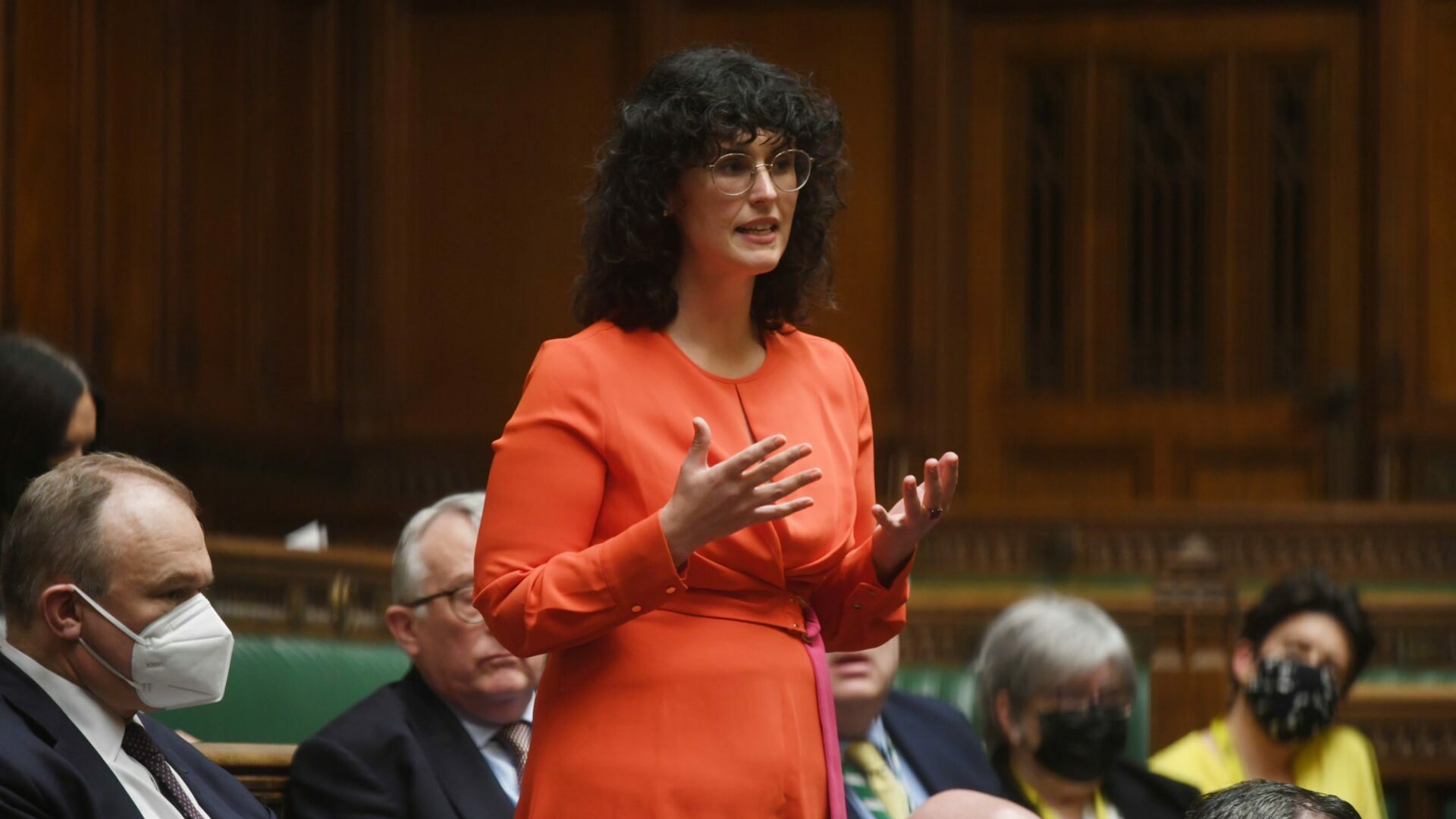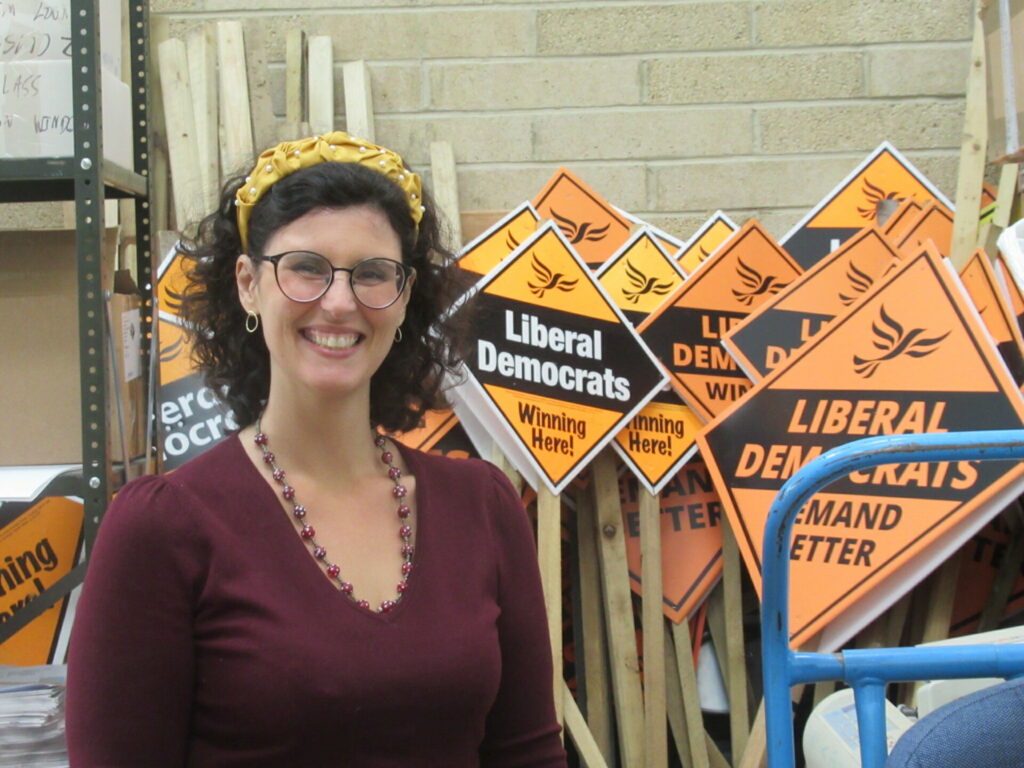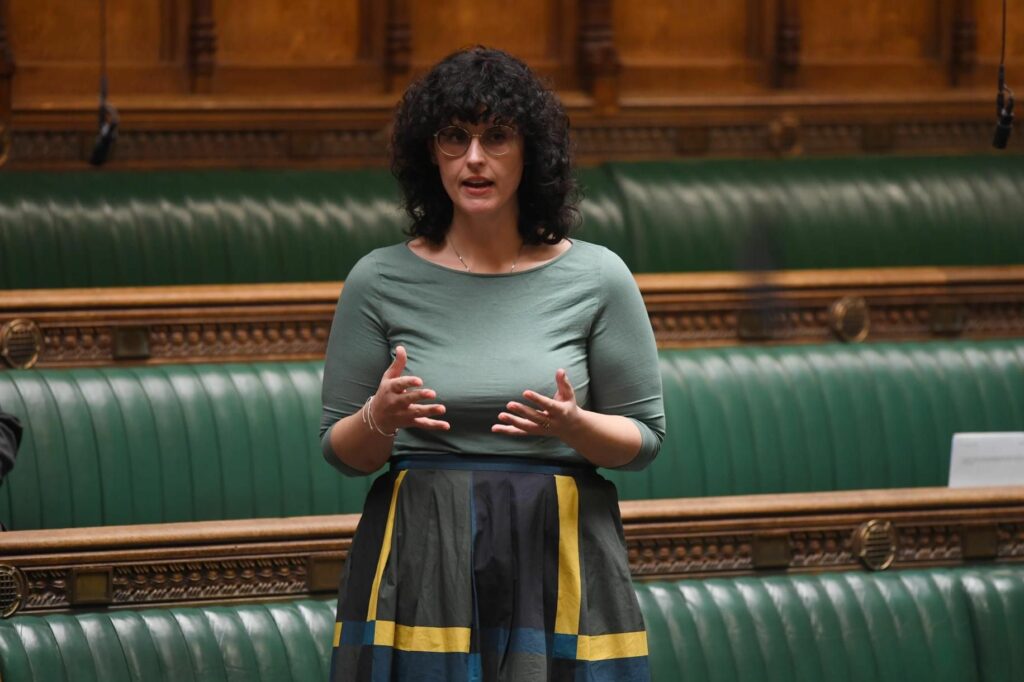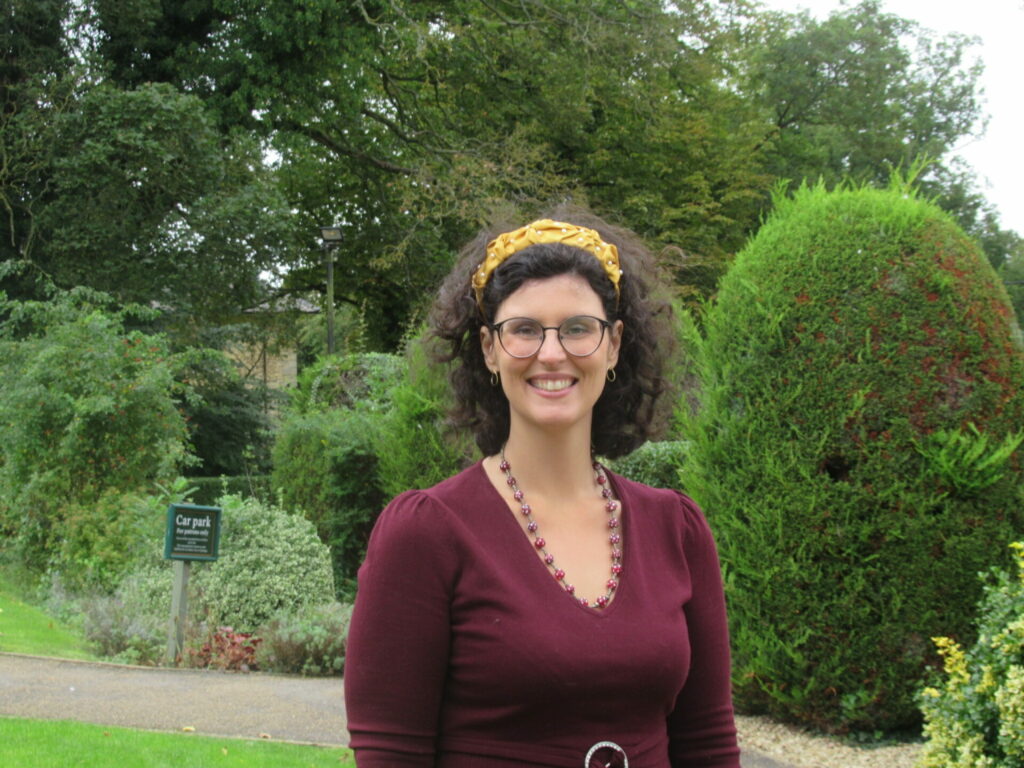Layla Moran: ‘Being outed so publicly and prematurely has left some scars’
Exclusive: “I was totally open to the idea [of not being straight]; I just didn’t know"

“Is it as manic as you expected?” Layla Moran, Liberal Democrat MP for Oxford West and Abingdon, asks me in her Westminster office. She’s just been working on a speech ahead of a poignant Westminster Hall debate about the use of non-disclosure agreements in the workplace, all stemming from the #MeToo movement. I’m interviewing her on the second day back after Parliament’s summer recess, and “manic” is definitely the word of the day. Twenty-four hours ago, Education Secretary Gillian Keegan was caught making a sensational off-the-cuff remark after an ITV interview, spelling a chaotic return to the House for the Tory party. Parliament is well and truly back.
But there’s an air of calm in Moran’s sphere, and the Lib Dems in general, who are hoping that the decline in public support for the Conservatives, as well as Labour’s complacency, could spur voters to turn more of the constituency map yellow.
“I was basically forced into [coming out], and I am a little bit upset about that still,” – Layla Moran
For Moran’s part, she knows she’s made history simply by appearing in Parliament, becoming the first MP of Palestinian descent. She is also the first publicly pansexual MP, though it wasn’t her choice to come out. Moran shared her sexuality on Twitter at the beginning of 2020 after being approached by the Mail On Sunday about her relationship.
“I was basically forced into [coming out], and I am a little bit upset about that still,” she admits. “I feel that no one should have to be offered the experience of being outed so publicly and prematurely. It has left some scars, and it makes me quite distrustful of the Westminster bubble. That’s the thing about this place: it can feel like everyone’s looking at you all the time. It’s that constant scrutiny,” she explains. While she recognises this is part and parcel of being an MP, Moran adds, “I do think that there comes a point where I should have been allowed my privacy to work out what was going on.”

She managed to take back some control of the situation, carrying out a positive interview with PinkNews, as well as a kinder follow-up interview with the Daily Mail.
Moran explains she had never been attracted to women before meeting her now fiancée. “I’d met this wonderful woman; we are now engaged. She’s clearly my person. I just never thought, when I was growing up, that my person could be a woman.”
Moran has a gay brother and sister, so she was never worried about not being accepted. She goes on to explain how she came to define herself as pansexual: “I was totally open to the idea [of not being straight]; I just didn’t know. This comes along later in life, and I’ve got these questions, and I’m forced to come up with — what is it? Because if I’m gay, like my sister and my brother, they’ve known since they were five. That wasn’t me. So, what word is that?”
“I was totally open to the idea [of not being straight]; I just didn’t know”
That’s when she came across the definition of pansexual on the internet, which focused on the connection between two minds, or two people: “I think all love is a bit like that, actually, and that explained it to me, so I picked that. What I absolutely did not think through,” she says, laughing, “was the fact that that would make me the first [publicly pansexual MP], or that, actually, for a tranche of population, this was just a completely new random term, and that in itself would cause a conversation.” Reflecting on the situation, she says if she’d had someone advising her at the time “we might not have gone with pansexual” and adds: “I think all the labels are a bit random.”

She goes on: “The bottom line is we turned the story around to be positive. If you’re going to talk about your private life from this seat, I should try and do it in a way that helps other people. What was lovely is after doing it, I did get emails saying, ‘You helped me to be able to explain to my parents about me,’ and I was like, ‘That’s amazing.’ So yes, it was really painful on a personal level, but there were quite a lot of positives that came out of it.”
“My election, in 2017, was completely unexpected”
Becoming an MP in Theresa May’s snap election had been yet another surprise for the former teacher. “My election, in 2017, was completely unexpected. I had secured a job as a deputy head in a school to start that September and was really excited about it.” She lived in a house share with her sister in her first year as an MP, before moving in with her fiancée, and reflects: “Fate intervened in that snap election — I wouldn’t be here otherwise.”
A few years later, in 2020, Moran ran to become party leader but was beaten by Ed Davey. He remains at the helm to this day, ahead of the ever-looming 2024 general election: “I reflect back on [running for leader] — was it the right thing to do?” says Moran, but she focuses on the good things that came out of taking part. It hasn’t put her off having another go either. “I haven’t totally written off ever doing it again, but it’s very far away in my mind,” she tells me. “Ed’s doing a fab job. I don’t think he’s going to be going anywhere anytime soon and I wouldn’t want him to.”
“Ed’s doing a fab job. I don’t think he’s going to be going anywhere anytime soon and I wouldn’t want him to”
Luckily, she couldn’t be more suited to her current role. Since 2020, she has been the Liberal Democrat Spokesperson for Foreign Affairs and International Development. Moran moved to Ethiopia in the 1980s at the age of five with her diplomat father at the height of the famine. There she witnessed the nation’s extraordinary poverty — which led to events such as Live Aid in the UK — while her family lived in a compound. “Even travelling to school, I saw kids my own age who had nothing, no shoes, on the side of the street. I asked questions, ‘Why is this happening?’ I remember very vividly, for example, we couldn’t move into our house for the first six months when we moved there, because there were military parades by the dictators. [Former head of state] Mengistu [was] outside your house every single day.”

Her father explained why there were tanks parading down the street on a daily basis, yet Moran had more questions. “From a very young age, I appreciated the cause and effect of how these politicians — in this case, it was a dictator — and rulers of a country, the impact it has on ordinary people, because those were the kids that I was relating to, and [I] just couldn’t understand why anyone would let any other human not have food.”
At school, Moran found herself “falling in love” with physics and went on to study the subject at Imperial College London. After graduation, unlike most of her fellow physicists, she shunned working in the City for a teaching role at an international school in Belgium.
“Even travelling to school, I saw kids my own age who had nothing, no shoes, on the side of the street”
“I was fresh back from university with a physics degree and no job. They said, ‘Do you want to come and substitute teach for a bit?” She was given on-the-job training which she describes as an “amazing experience”, and soon became a head of year.
A highlight of her previous career, Moran shares, was the pastoral side. “It’s not just about the subject you’re teaching, it’s about the wellbeing of that child coming into your classroom,” she says. Moran recalls one specific interaction she had with a child: “I’ll never forget a kid who had been self-harming for a really long time. We struck up a relationship because she was really into planets. We’d sit and talk about planets. Through that, she would talk a little bit about what she was feeling inside. I remember speaking with her mum, who was like, ‘She’s never connected to another teacher that way before, and it’s really helping her mental health that you’re taking such an interest.’ That is what got me passionate about high-quality education.”
So, what took her into politics? She became more heavily involved at a time when the party “recognised it had a diversity problem” and started looking for women who would be keen to try to make it into Parliament.
That teaching instinct kicked in again. “I’ve always had the approach that everything is learnable, and you can do anything if you put your mind to it, you’ve just got to put in the hard graft,” she says. “I learned the craft of being a candidate. I stood in the 2010 general election in Battersea with no hope of [gaining] a seat,” she remembers. It was the election that resulted in the Conservative-Lib Dem coalition. Moran stood again in 2015 and came second, before finally winning her seat in 2017.
“I’ve always had the approach that everything is learnable, and you can do anything if you put your mind to it”
Ahead of next year’s general election, one vital topic she and the party’s mainstay do agree on is the Lib Dems’ ongoing commitment to LGBT+ rights, which has been long established. Indeed, this year marks the 10th anniversary of same-sex marriage, a major Lib Dem initiative. Moran makes it clear that during the coalition years the party was “very robust in their challenge to more extreme parts of the Conservative Party”, resulting in some of the more liberal policies that were introduced during that period.
She adds: “We got a lot wrong and have apologised musically for some of it, [but] we have to hold our heads up proud for some of the stuff that did happen in that coalition. We’re celebrating the 10th year of equal marriage, which was entirely, 100 per cent, a Lib Dem initiative.”
At the time, it was put forward by Lynne Featherstone, the MP for Hornsey and Wood Green, as well as Equalities Minister, who got Theresa May on board. Moran adds: “It’s pretty galling that recently David Cameron has been trying to take credit for that! Success has many fathers, and it’s true, if he’d have decided to completely block it, it wouldn’t have happened. But I’m not sure that’s quite how he’s selling it…”
“It’s pretty galling that recently David Cameron has been trying to take credit for [equal marriage]!”
Moran says there was “absolutely nothing” separating herself and Davey on LGBTQ+ policy when they both ran for leadership, and there still isn’t: “Ever since, the party has kept that unity. There are members who take a different view and call themselves gender critical, but they’ve got themselves elected onto federal councils, boards and working groups, and actually, they are also welcome in the party, but the party’s very clear stance is that we stand with the trans community.”
Moran speaks with care and consideration about the clear “detrimental effect” some of the rhetoric now being used against the trans community is having. “It’s very reminiscent of what used to be used against the lesbian and gay community way back when,” she says. “Particularly, we’re talking about trans women being in some way a predator or in some way dangerous,” she notes, commenting that the debate has reached a “very bad place”. She also criticises Labour’s new plans to go back on previous commitments to allow transgender people to self-identify. “It’s really regrettable,” says Moran. “The Lib Dems are standing firm when other parties have prevaricated… I was so sad to see that Labour have now rowed back on self-ID. That’s the wrong thing to do.
“What I would say to the LGBT+ community is you have an unwavering ally in the Liberal Democrats. We’ve been right before. We were the ones who brought equal marriage, but long before that we’ve championed equal rights in all of its forms. We will continue to do that, even if we get flack, because some things are just the right thing to do.”
This interview was conducted in September 2023.
